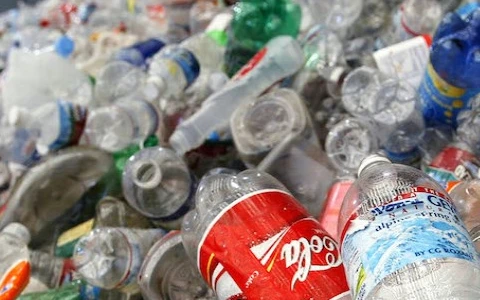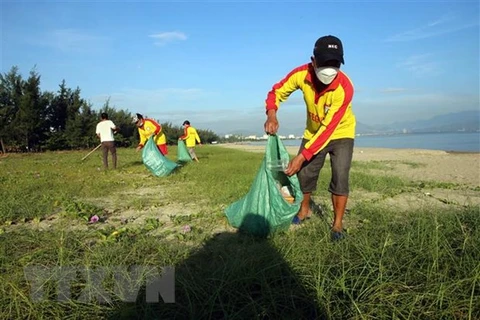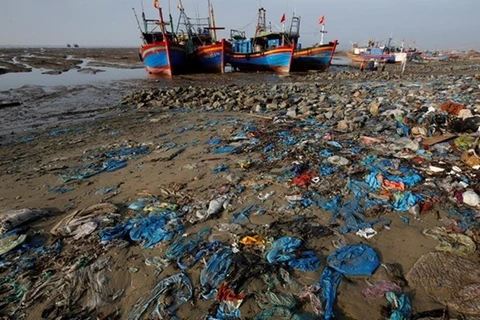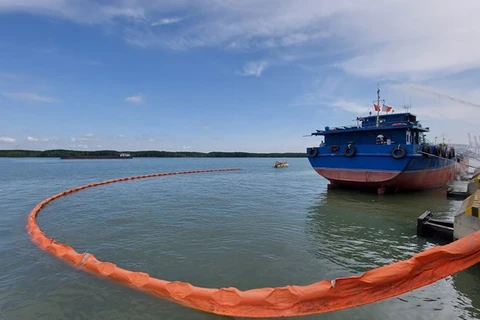 Delegates atteding the second part of the 25th COBSEA Intergovernmental Meeting (Photo: Ministry of Natural Resources and Environment)
Delegates atteding the second part of the 25th COBSEA Intergovernmental Meeting (Photo: Ministry of Natural Resources and Environment) The second part of the 25th COBSEA Intergovernmental Meeting was chaired by the Vietnamese Ministry of Natural Resources and Environment (MoNRE).
Statistics show that each year, about 8 million tonnes of plastic waste are dumped into the sea, equivalent to a truck full of garbage dumped into the sea every minute. Globally, the amount of solid plastic waste generated annually is equivalent to more than 520 trillion plastic straws, enough to wrap around the earth about 2.8 million times.
Vietnam is among countries that discharge a large amount of plastic waste into the ocean. Land-based plastic waste sources are considered the main source of waste and the discharge of this source is at a larger scale than that in the ocean.
Specifically, up to 80% of plastic waste comes from the mainland, from production and human activities, the remaining 20% comes from fishing, aquaculture, and ships at sea.
Deputy General Director of the MONRE's Vietnam Administration of Seas and Islands (VASI) Pham Thu Hang said COBSEA is seriously committed to enhancing pollution prevention such as ocean sewage and eutrophication at sea and pollution that is generated from the mainland.
The event also afforded Vietnam a chance to make active contributions to regional and global initiatives on marine plastic waste, the blue marine economy, marine and coastal spatial planning, and marine protected areas.
During the two-day meeting, delegates heard a report on COBSEA’s activities, adopted an action plan on marine waste, established the EAS Regional Node within the framework of the global partnership on marine waste, and updated negotiations on achieving international legally binding tools to end plastic pollution.
Within the framework of the meeting, the Vietnam Administration of Seas and Islands also chaired a consultation with relevant ministries, localities, agencies, and international enterprises on the establishment of an international legally binding instrument on plastic pollution. This will help to prepare for Vietnam's participation at the upcoming first Session of the Intergovernmental Negotiating Committee in Uruguay.
According to the Ministry of Natural Resources and Environment, plastic pollution is a big challenge. In Vietnam, statistics show that on average, the country generates about 1.8 million tonnes of plastic waste each year, among the 20 countries with the largest amount of waste.
The first part of the meeting was held online in September. The 26th meeting will be hosted by Cambodia next year.
The COBSEA oversees the implementation of the East Asian Seas Action Plan, adopted in April 1981 and revised in 1994. The Action Plan for the Protection and Development of the Marine Environment and Coastal Areas of the East Asian Seas Region (the East Asian Seas Action Plan) aims at protecting the marine and coastal environment in the region for the health and well-being of present and future generations.
At the request of participating countries, the Regional Coordinating Unit for the Action Plan was established in 1993, functioning as a Secretariat for COBSEA. The Secretariat is hosted by Thailand and administered by the United Nations Environment Programme (UNEP).
COBSEA brings together nine countries of Cambodia, China, Indonesia, the Republic of Korea, Malaysia, the Philippines, Thailand, Singapore and Vietnam for the sustainable development and protection of the marine environment and coastal areas of the region.
Efforts are focused on addressing marine pollution, strengthening marine and coastal planning and management, and strengthened regional governance for marine environmental management.
COBSEA is one of 18 Regional Seas programmes for the sustainable management and use of the marine and coastal environment. Individual Regional Seas programmes reflect a similar approach, tailored to address regional context and environmental challenges while supporting delivery of global environmental and development goals./.
VNA























